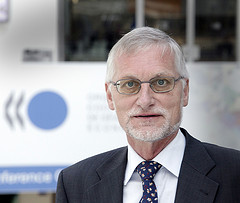By Jon Lomøy* | IDN-InDepth NewsAnalysis
PARIS (IDN | OECD) – By the end of 2015, when the Millenium Development Goals (MDGs) come to term, the international community is expected to approve a new sustainable development agenda. All indications are that this will be a unique and universal agenda, focusing on the eradication of extreme poverty, but also addressing broader environmental, economic and social sustainability challenges. Finding the means to finance this broad agenda, and to make that financing work to produce maximum results without duplication or gaps, will be a challenge.
ODA – official development assistance or what people commonly refer to as aid – has been instrumental in financing development over the past fifty years through grants and low-interest loans that have helped to address economic and social needs. Likewise, private finance has provided considerable benefits to some countries through bank lending, direct investment and indirect investments such as portfolio flows. Nonetheless, we cannot rely on private finance alone, as it can introduce volatility and fuel vulnerability to financial crises, with costly and damaging results in some cases.
Today, many developing countries are complementing traditional development resources by successfully mobilising increasing volumes of domestic resources through improved tax systems and by better combatting illicit financial flows. This trend is substantially augmented by a major transformation of the international development finance landscape – with new actors, new sources of finance and new technologies – enabling partnerships that have vastly expanded opportunities and options for tapping additional sources of development finance, both within and outside of countries.
In this context, the challenges faced by the global community are not simple. What is the continuing role of official development finance in the post-2015 era? How should it best be allocated and delivered to ensure it is as effective as possible?
The advent of a new post-2015 agenda, including a new financial framework, and the possibility of establishing a process to monitor their implementation, is an exciting prospect and one and that merits the global community’s full attention to important questions:
– How to mobilise and channel the resources needed?
– What is the ongoing role of development co-operation in a much more diversified financing landscape? How can it make the largest possible contribution?
– How can developing countries make best use of the financial resources on offer?
– How can the international system facilitate this (e.g. through capacity support, transparency and accountability)?
– How can the international community ensure that no countries – or communities within them – are left behind?
The first High-Level Meeting of the Global Partnership for Effective Development Co-operation offers a unique opportunity to table these discussions and contribute to forging a sustainable development vision for the post-2015 era. It will also provide the opportunity to encourage synergies among country, regional and global policy discourse on development financing needs and sources.
The participation of UNDP Administrator Helen Clark, OECD Secretary-General Angel Gurría, ministers from developed and developing countries, heads of foundations and others will be fundamental in pushing forward the global debate on the future of development finance. We expect concrete deliverables to emerge, helping to ensure that the changing landscape of development co-operation can operate within an effective and sustainable policy and financing framework.
*Jon Lomøy is Director of the OECD Development Co-operation Directorate, which is leading work to modernise the DAC statistical system and devise new, broader measure of total official support for development. This feature article originally appeared in DACnews April 2014 under the headline ‘Financing development co-operation in a new era’. [IDN-InDepthNews – April 14, 2014]
Photo: The writer | Credit: OECD
2014 IDN-InDepthNews | Analysis That Matters
Send your comment | Subscribe to IDN newsletter
Follow us on Twitter and Facebook:
http://twitter.com/InDepthNews
http://www.facebook.com/IDN.GoingDeeper

